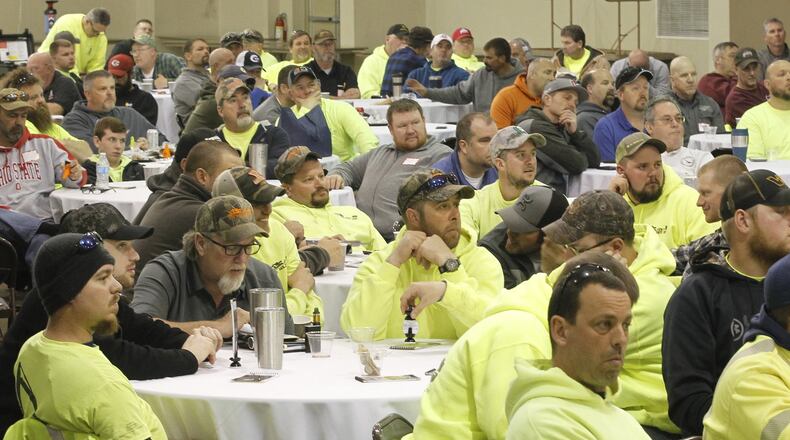“There’s a lot of stuff in the ground just in your yard that you might not even think is there,” said Joe Presutti, an equipment operator and arborist with the city of Centerville. “Just planting a tree or cutting a bed-edging in your yard, you could cut through something. It’s a big deal.”
MORE: City working to identify lead pipes in water system
Utility lines can be severed just aerating lawns, said Kevin Campbell, chairman of the Miami Valley Utility Safety Council.
“It’s penetrating the soil,” he said. “Cable and telephone lines are generally pretty shallow and you can very easily cut into those communications service lines — even using a Rototiller.”
Campbell was among those on a panel last week at a Safe Dig event attended by about 180 workers for regional excavation and utility companies who turn dirt for a living.
MORE: Montgomery County commissioners approve water, sewer rate increase
While going without cable or phone service for a day or two might be an inconvenience, mishaps with buried electrical lines are an immediate danger to workers and in the case of gas lines, can threaten entire neighborhoods.
In 2011, one person died and six were injured, including three young children, in a Fairborn house explosion after a backhoe operator digging for a water pipe ruptured a gas line. The explosion sent debris — and a baby — into the yard and killed a 75-year-old man whose body wasn’t found until the next day.
Last summer, the Hi-Point Free Will Baptist Church in Bellefontaine was leveled in an explosive flash after workers hit a gas line. Just last week, Deerfield Towne Center in Mason was evacuated after workers installing communications lines hit a natural gas line.
MORE: What’s next for Bellefontaine church destroyed in explosion?
Calling 8-1-1 is not only Ohio law for pros like Presutti. The rule extends to any excavation, including the kind of work associated with many springtime jobs around the home, he said.
“You are still going to deal with the same stuff we’re dealing with. (Utilities) are still going to be on your property somewhere.” Presutti said. “If you’re even going to do general lawn work — bedding and edging — you’re going to need to call.”
Planting trees, grinding roots and digging post holes for fences or mailboxes can also expose hazards, experts said. Grading of topsoil and years of erosion can also leave utilities closer to the surface than expected. And a large tree dropping to the ground can jar a pipe many feet deep, said Jason Broyles, Ohio Utilities Protection Service’s public awareness and services coordinator.
“We recommend them calling to allow those utility companies to come out and locate the lines to make sure they are not dropping that 3,000-pound tree on a gas line,” he said.
The service is free for residents.
MORE: State OKs Vectren takeover of Wright-Patt natural gas pipelines
In 2016, the state beefed up enforcement of a law that requires all utilities to participate in a program like the Ohio Utilities Protection Service, Broyles said.
The protection service, which takes 8-1-1 calls, received more than 1.3 million requests last year to locate utilities. After shuttling the requests to the various utility providers, some 9 million individual tickets were generated to mark the assorted buried cables, lines, distribution pipes and sewers, according to the service.
The 8-1-1 service will only locate utility-owned lines, Broyles said, typically those up to the meter.
MORE: Millions to be spent for pipeline replacements
Companies can be subject to complaints and fined for breaking the rules, he said, but the state isn’t trying to build revenue from enforcement actions. The money is put into grants for excavator training.
“It’s about keeping our utilities safe and keeping our general public safe,” Broyles said.
You don’t have to be a professional excavator or a big company like Vectren or Duke Energy to be subject to a complaint, Broyles said.
“If you’re a homeowner and out digging in the right-of-way next to the road and completely flagrant in what you are doing and you do major damage, realistically the (utility) company could file a complaint,” he said. “More realistically they will try to educate the homeowner and the homeowner may incur some charges for repairs.”
Before you dig
Call 8-1-1 or 1-800-362-2764, at least 48 hours but no more than 10 working days (excluding weekends and legal holidays) before digging. Within 48 hours (excluding weekends and legal holidays), each utility will locate and mark its underground utilities. A form can also be submitted electronically at www.oups.org.
About the Author

